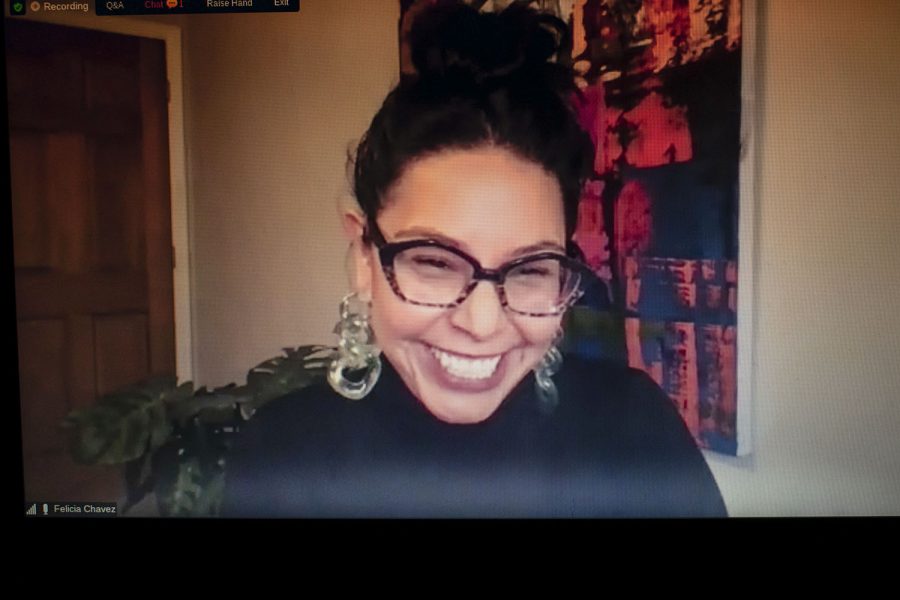Author and UI alum Felicia Rose Chavez presents ‘The Anti-Racist Writing Workshop’ at Prairie Lights virtual reading
At a Prairie Lights virtual reading on Friday night, Felicia Rose Chavez stressed the importance of altering the traditional writers’ workshop in her memoir ‘The Anti-Racist Writing Workshop.’ At the event, she encouraged audience members to fight to change archaic methods that silence underrepresented voices in writing.
Felicia Rose Chavez is seen at the Prairie Lights Bookstore online event “Felicia Rose Chavez, The Anti-Racist Writing Workshop: How to Decolonize the Creative Classroom Confirmation” on Friday, Feb. 12, 2021. (Raquele Decker/The Daily Iowan)
February 12, 2021
As a woman of color in writing workshops dominated by white men, Felicia Rose Chavez said she felt isolated and alone in a community that discouraged her from fighting for the changes she wished to see in her education.
University of Iowa Nonfiction Writing Program MFA graduate Felicia Rose Chavez read from her part memoir, part teaching guide, The Anti-Racist Writing Workshop: Decolonizing the Creative Classroom at a Prairie Lights virtual event on Friday night. In her book, she chronicled experiences in racist classroom environments in order to present new teaching methods.
As a first-generation college student at DePaul University and graduate student at the UI, Chavez said she experienced many incidents that led her to write a memoir that urges change.
“I lived the book before I wrote the book,” Chavez said.
At her reading, the author retold a chilling story from her time at the UI’s Nonfiction Writing Program, where a professor perpetuated white dominance within the workshop by requiring students to vote for either a visiting writer of color or a “quality” visiting writer. She and some of her colleagues had to fight to create a class called “Toward a New Canon” to platform contemporary writers of color because their work was not being studied in other courses provided by the university.
RELATED: University of Iowa Professor’s Graphic Novel Sheds Light on Historical Racial Uprising
After giving a speech about these experiences at an academic conference in Iceland, the response she received inspired her to write a book that provides tangible solutions to the institutional racism engrained in traditional writing workshops.
The hybrid memoir is directed at teachers, students, and those wishing to instigate change within classrooms. It is centered on higher education because of Chavez’s primary experience working with undergraduate classes but said she hopes for the book to have an even broader impact.
“My hope is that educators across the spectrum can extrapolate strategies that would be relevant for them,” Chavez said.
She also said she hopes that the memoir will be used as a resource to embolden educators to give all of their students a platform, particularly students of color, and ease intimidation in educators who wish to change their classrooms, but are uncertain how to start the process. Chavez urged educators to loosen their grip on their classrooms because this show of authority leaves students of color behind.
“It is essential that we relinquish this domination over our classrooms because this exercise of control and authority erases children of color,” she said.
For students, Chavez said she hopes the book inspires them to fight for changes they want to see within their classrooms. She encouraged a student at the reading to make requests to their professors and open a conversation with them.
“Students can see immediate change if their requests are specific enough,” Chavez said.
Through these dialogues, Chavez said she sees students becoming global citizens, with the hope that her memoir emboldens students of color who are lacking support and feel as if they don’t exist.
During the virtual reading, the author challenged all those present to fight for change by reading heart-rending excerpts from the memoir that present deeply personal experiences with racism in all aspects of her life. She said in an interview with The Daily Iowan that she wanted the memoir to feel urgent and personally move people. While reading the closing of the book, she moved herself to tears.
RELATED: Iowa City authors speak on historical fiction novel about Mary Shelley
Throughout the memoir, she urges people to create a classroom that prioritizes listening over speaking and focuses on the process instead of the end result.
“The ideal classroom is one that inspires young people to honor their inner knowledge, their mentors, themselves as writers, and their individual writing legacies,” Chavez said.
In this acknowledgment of their own voice, the author said, a student can better exercise listening to those around them.
Chavez said she hopes that everyone will pull from The Anti-Racist Writing Workshop that internal evaluation is necessary for the reform of systems that are entrenched within society.
“It is essential for each and every one of us to reflect on how our pedagogical processes reinforce institutional and individual racism,” she said. “Neutrality and objectivity do not exist. We must examine our own implicit bias in order to truly decolonize each and every one of our classrooms.”














